How They Voted. Illinois Representatives’ Votes in Congress
Chronicle Media — July 29, 2017UNITED STATES HOUSE OF REPRESENTATIVES
Economic 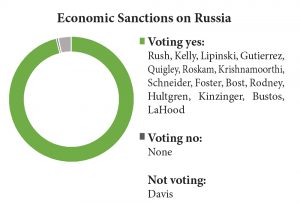 Sanctions on Russia: Voting 419 for and three against, the House passed on July 25 a bill (HR 3364) that would establish a process for Congress to block any U.S. president from softening or removing U.S. economic sanctions on Russia. The bill would also place a range of new sanctions on the Russian economy while putting into law several Obama-era executive orders penalizing the Kremlin for its interventions in the United States and other countries. Both the new and existing penalties are responses to Russia’s cyber-interference in U.S. elections, annexation of Crimea, aggression in Ukraine and support of the regime of Syrian President Bashar al-Assad. The bill would also add new U.S. economic sanctions on Iran and North Korea.
Sanctions on Russia: Voting 419 for and three against, the House passed on July 25 a bill (HR 3364) that would establish a process for Congress to block any U.S. president from softening or removing U.S. economic sanctions on Russia. The bill would also place a range of new sanctions on the Russian economy while putting into law several Obama-era executive orders penalizing the Kremlin for its interventions in the United States and other countries. Both the new and existing penalties are responses to Russia’s cyber-interference in U.S. elections, annexation of Crimea, aggression in Ukraine and support of the regime of Syrian President Bashar al-Assad. The bill would also add new U.S. economic sanctions on Iran and North Korea.
The measure would apply to Russian economic sectors such as mining, metals, shipping and railways. It is intended to address corruption and human rights abuses in Russia, impose financial penalties on non-Russian entities and individuals that provide the Kremlin with certain types of commercial support, and penalize entities that supply weapons to the Syrian regime.
Michael McCaul, R-Texas, said he was briefed in October “by our intelligence community. They told me that Russia engaged in a blatant effort to meddle in our domestic affairs and, specifically, our democratic process. I was an outspoken supporter of the need for a strong response then and I remain so now.”
David Cicilline, D-R.I., said: “Given our president’s complete unwillingness to hold Russia accountable for their attack — and let’s not mistake it for anything else; it was an attack on America — it has become necessary for Congress to assert its role in this area and ensure that Russia will be held accountable.”
No member spoke against the bill.
A yes vote was to send the bill to the Senate.
 $800 Billion In 2018 Spending: Voting 235 for and 192 against, the House on July 27 approved a package of four appropriations bills for fiscal 2018 (HR 3219) totaling nearly $800 billion, including $1.6 billion for construction of President Trump’s proposed U.S.-Mexico border wall; $584.2 billion for basic military operations; $73.9 billion for operations in war zones; $88.8 billion for veterans’ programs and military construction; $37.6 billion for water projects and Department of Energy operations and $3.6 billion for running the legislative branch other than the Senate. Overall, the bill funds four of Congress’s 12 appropriations bills. Overall, the bill funds four of Congress’s 12 appropriations bills for the budget year beginning Oct. 1.
$800 Billion In 2018 Spending: Voting 235 for and 192 against, the House on July 27 approved a package of four appropriations bills for fiscal 2018 (HR 3219) totaling nearly $800 billion, including $1.6 billion for construction of President Trump’s proposed U.S.-Mexico border wall; $584.2 billion for basic military operations; $73.9 billion for operations in war zones; $88.8 billion for veterans’ programs and military construction; $37.6 billion for water projects and Department of Energy operations and $3.6 billion for running the legislative branch other than the Senate. Overall, the bill funds four of Congress’s 12 appropriations bills. Overall, the bill funds four of Congress’s 12 appropriations bills for the budget year beginning Oct. 1.
Rodney Frelinghuysen, R-N.J., said the bill is devoted “to funding our critical military priorities, supporting veterans and making our borders more secure.”
Tim Ryan, D-Ohio, asked: “Why is there a single dime of American taxpayer money for a border wall that President Trump promised Mexico would finance?”
A yes vote was to send the bill to the Senate.
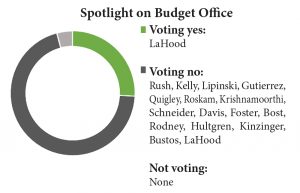 Spotlight on Budget Office: Voting 107 for and 314 against, the House on July 26 rejected an attempt to cut the Congressional Budget Office’s 2018 operating budget by half, or $25.4 million, in response to what critics said were the CBO’s grossly inaccurate projections several years ago of the number of people who would gain health insurance under the Affordable Care Act. The amendment was proposed to HR 3219 (above). One of the few non-partisan offices on Capitol Hill, the CBO and its professional staff are charged with forecasting the budgetary impacts of measures considered by the House and Senate.
Spotlight on Budget Office: Voting 107 for and 314 against, the House on July 26 rejected an attempt to cut the Congressional Budget Office’s 2018 operating budget by half, or $25.4 million, in response to what critics said were the CBO’s grossly inaccurate projections several years ago of the number of people who would gain health insurance under the Affordable Care Act. The amendment was proposed to HR 3219 (above). One of the few non-partisan offices on Capitol Hill, the CBO and its professional staff are charged with forecasting the budgetary impacts of measures considered by the House and Senate.
Scott Perry, R-Pa., said “the CBO simply must be held accountable for its consistent failure to accurately or even reasonably predict budget and economic impacts of legislation.”
John Yarmuth, D-Ky., said: “It should be embarrassing to my Republican colleagues that they are launching these attacks simply because they do not have the courage to defend the damaging effects of their plan to repeal the Affordable Care Act.”
A yes vote was to cut the CBO budget.
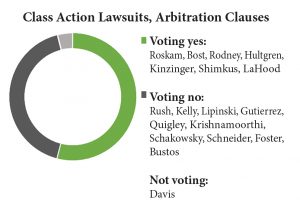 Class Action Lawsuits, Arbitration Clauses: Voting 231 for and 190 against, the House on July 25 nullified a new Consumer Financial Protection Bureau rule that would enable individuals with similar grievances to band together in class-action lawsuits against credit card issuers, banks, payday lenders and other retail financial firms regulated by the bureau. Consumers entering into contracts with financial firms are now required to agree to use mandatory arbitration to resolve disputes, thus signing away their right to pursue claims in court. The rule scheduled to take effect in mid-September prohibits the use of arbitration clauses to bar customers from participating in class-action suits. Mandatory arbitration is conducted by company-approved mediators under rules that limit discovery, bar disclosure of the outcome and prohibit meaningful appeals.
Class Action Lawsuits, Arbitration Clauses: Voting 231 for and 190 against, the House on July 25 nullified a new Consumer Financial Protection Bureau rule that would enable individuals with similar grievances to band together in class-action lawsuits against credit card issuers, banks, payday lenders and other retail financial firms regulated by the bureau. Consumers entering into contracts with financial firms are now required to agree to use mandatory arbitration to resolve disputes, thus signing away their right to pursue claims in court. The rule scheduled to take effect in mid-September prohibits the use of arbitration clauses to bar customers from participating in class-action suits. Mandatory arbitration is conducted by company-approved mediators under rules that limit discovery, bar disclosure of the outcome and prohibit meaningful appeals.
Ken Buck, R-Colo., said: “Arbitration allows parties to use an independent mediator, instead of hiring expensive lawyers, to settle a dispute. While the (new) rule…is a bad deal for consumers, it is a huge win for trial lawyers, who make an average of $1 million per case.”
Marcy Kaptur, D-Ohio, said “so-called forced arbitration clauses…prevent cheated or defrauded consumers from going to court. In other words, they prevent the victims from going to court (and) handcuff the customers, not the megabanks that took them to the cleaners.”:
A yes vote was to send the measure (HJ Res 111) to the Senate.
UNITED STATES SENATE
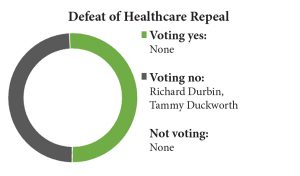 Defeat of Healthcare Repeal: Voting 49 for and 51 against, the Senate defeated on July 28 a GOP-sponsored measure to dismantle the Af fordable Care Act, ending the latest attempt by congressional Republicans to take down the 2010 law also known as Obamacare. This amendment to HR 1628 sought to eliminate the law’s individual and employer mandates; scale back Medicaid; delay an excise tax on medical devices; expand Health Savings Accounts; weaken the ACA’s minimal coverage standards and put a one-year hold on patients using Medicaid for Planned Parenthood care, among other provisions. The Congressional Budget Office said the measure would increase the number of uninsured Americans by 15 million next year while sharply raising the cost of premiums in the individual insurance market.
Defeat of Healthcare Repeal: Voting 49 for and 51 against, the Senate defeated on July 28 a GOP-sponsored measure to dismantle the Af fordable Care Act, ending the latest attempt by congressional Republicans to take down the 2010 law also known as Obamacare. This amendment to HR 1628 sought to eliminate the law’s individual and employer mandates; scale back Medicaid; delay an excise tax on medical devices; expand Health Savings Accounts; weaken the ACA’s minimal coverage standards and put a one-year hold on patients using Medicaid for Planned Parenthood care, among other provisions. The Congressional Budget Office said the measure would increase the number of uninsured Americans by 15 million next year while sharply raising the cost of premiums in the individual insurance market.
A yes vote was to repeal the core of the 2010 health law.
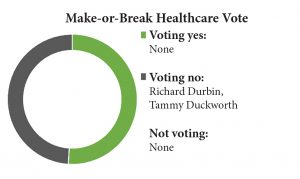 Make-or-Break Healthcare Vote: By a tally of 51 for and 50 against, with Vice President Mike Pence casting the decisive vote, the Senate agreed on July 25 to start debate on a Ho use-passed bill (HR 1628, above) that was the legislative vehicle for later votes (below) to repeal, replace or overhaul the Affordable Care Act, also known as Obamacare. Had Republicans lost this crucial vote, they would have faced a choice of either pausing their seven-year fight against the ACA or inviting Democrats to work with them to draft a bipartisan replacement law.
Make-or-Break Healthcare Vote: By a tally of 51 for and 50 against, with Vice President Mike Pence casting the decisive vote, the Senate agreed on July 25 to start debate on a Ho use-passed bill (HR 1628, above) that was the legislative vehicle for later votes (below) to repeal, replace or overhaul the Affordable Care Act, also known as Obamacare. Had Republicans lost this crucial vote, they would have faced a choice of either pausing their seven-year fight against the ACA or inviting Democrats to work with them to draft a bipartisan replacement law.
A yes vote was to start debate on a not-yet-written GOP plan to dismantle the 2010 health law.
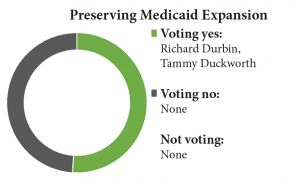 Preserving Medicaid Expansion: Voting 48 for and 52 against, the Senate rejected on July 26 a Democratic motion to strip HR 1628 (above) of provisions that would curtail Medicaid benefits for those currently eligible, prevent or discourage additional states from expanding Medicaid coverage under the Affordable Care Act or shift additional Medicaid costs to state governments.
Preserving Medicaid Expansion: Voting 48 for and 52 against, the Senate rejected on July 26 a Democratic motion to strip HR 1628 (above) of provisions that would curtail Medicaid benefits for those currently eligible, prevent or discourage additional states from expanding Medicaid coverage under the Affordable Care Act or shift additional Medicaid costs to state governments.
A yes vote was to protect the current health law’s expansion of Medicaid.
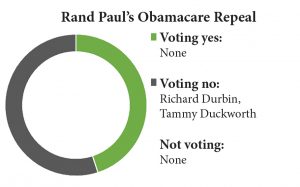 Rand Paul’s Obamacare Repeal: Voting 45 for and 55 against, the Senate rejected on July 26 a proposal by Rand Paul, R-Ky., that would partially repeal the Affordable Care Act over two years. The amendment to HR 1628 (above) would scrap the current requirement that individuals carry health insurance or pay a tax penalty, the mandate that larger employers provide workers with health coverage, and tax provisions that help fund the health care law. Two years later, the law’s federal subsidies for Americans buying individual coverage through public exchanges would end, as would the ACA’s expansion of Medicaid in 31 states. The amendment would leave in place coverage standards for health policies and protections for persons with pre-existing medical conditions.
Rand Paul’s Obamacare Repeal: Voting 45 for and 55 against, the Senate rejected on July 26 a proposal by Rand Paul, R-Ky., that would partially repeal the Affordable Care Act over two years. The amendment to HR 1628 (above) would scrap the current requirement that individuals carry health insurance or pay a tax penalty, the mandate that larger employers provide workers with health coverage, and tax provisions that help fund the health care law. Two years later, the law’s federal subsidies for Americans buying individual coverage through public exchanges would end, as would the ACA’s expansion of Medicaid in 31 states. The amendment would leave in place coverage standards for health policies and protections for persons with pre-existing medical conditions.
A yes vote was to adopt the most extensive repeal measure before the Senate.
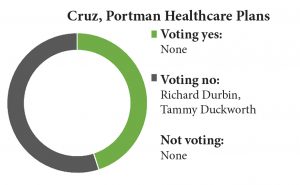 Cruz, Portman Healthcare Plans: Voting 43 for and 57 against, the Senate on July 25 failed to reach 60 votes needed to advance a pair of changes that GOP Sens. Ted Cruz of Texas and Rob Portman of Ohio proposed to HR 1628 (above). Cruz sought to allow insurers to sell low-cost, bare-bones policies in states where they also offer at least one policy compliant with the Affordable Care Act. Portman sought a $100 billion authorization over 10 years for defraying out-of-pocket costs faced by individuals compelled by the GOP bill to transfer from Medicaid to private insurance.
Cruz, Portman Healthcare Plans: Voting 43 for and 57 against, the Senate on July 25 failed to reach 60 votes needed to advance a pair of changes that GOP Sens. Ted Cruz of Texas and Rob Portman of Ohio proposed to HR 1628 (above). Cruz sought to allow insurers to sell low-cost, bare-bones policies in states where they also offer at least one policy compliant with the Affordable Care Act. Portman sought a $100 billion authorization over 10 years for defraying out-of-pocket costs faced by individuals compelled by the GOP bill to transfer from Medicaid to private insurance.
A yes vote was to adopt the Cruz-Portman healthcare package.
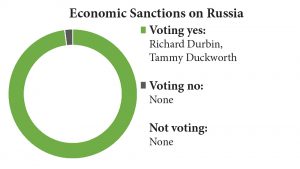 Economic Sanctions on Russia: Voting 98 for and two against, the Senate on July 27 passed and sent to the White House a House-passed bill (HR 3364, above) intended to prevent any U.S. president from softening or removing U.S. economic sanctions on Russia without congressional approval. The bill would also place new sanctions on Russia, Iran and North Korea while putting into law several Obama-era executive orders penalizing the Kremlin for its interventions in the United States and other countries. The measure would apply to Russian economic sectors such as mining, metals, shipping and railways; address corruption and human rights abuses in Russia; impose financial penalties on non-Russian entities and individuals that provide the Kremlin with certain types of commercial support, and penalize entities that supply weapons to the Syrian regime.
Economic Sanctions on Russia: Voting 98 for and two against, the Senate on July 27 passed and sent to the White House a House-passed bill (HR 3364, above) intended to prevent any U.S. president from softening or removing U.S. economic sanctions on Russia without congressional approval. The bill would also place new sanctions on Russia, Iran and North Korea while putting into law several Obama-era executive orders penalizing the Kremlin for its interventions in the United States and other countries. The measure would apply to Russian economic sectors such as mining, metals, shipping and railways; address corruption and human rights abuses in Russia; impose financial penalties on non-Russian entities and individuals that provide the Kremlin with certain types of commercial support, and penalize entities that supply weapons to the Syrian regime.
A yes vote was to send the bill to President Trump for either his signature or veto.



